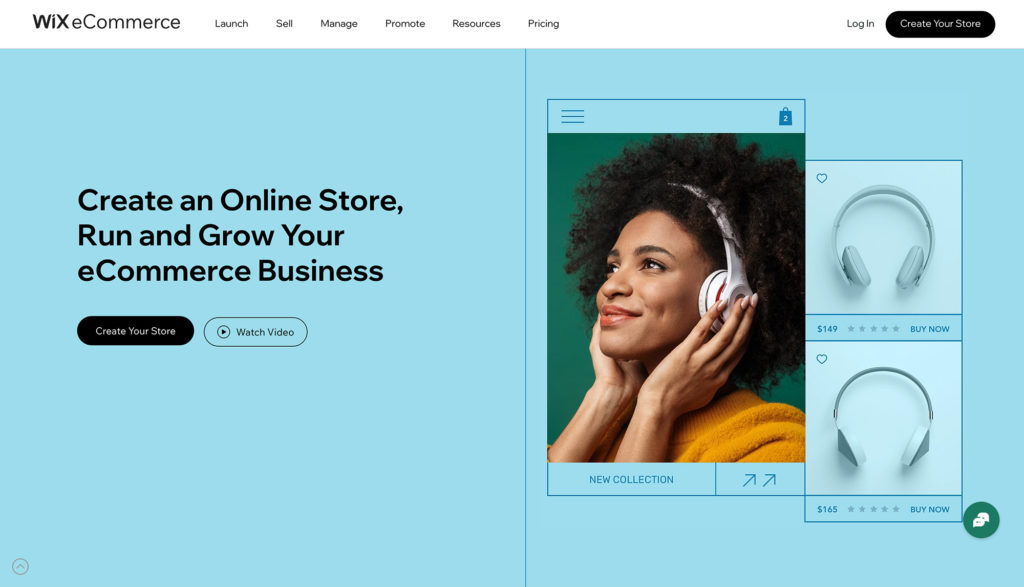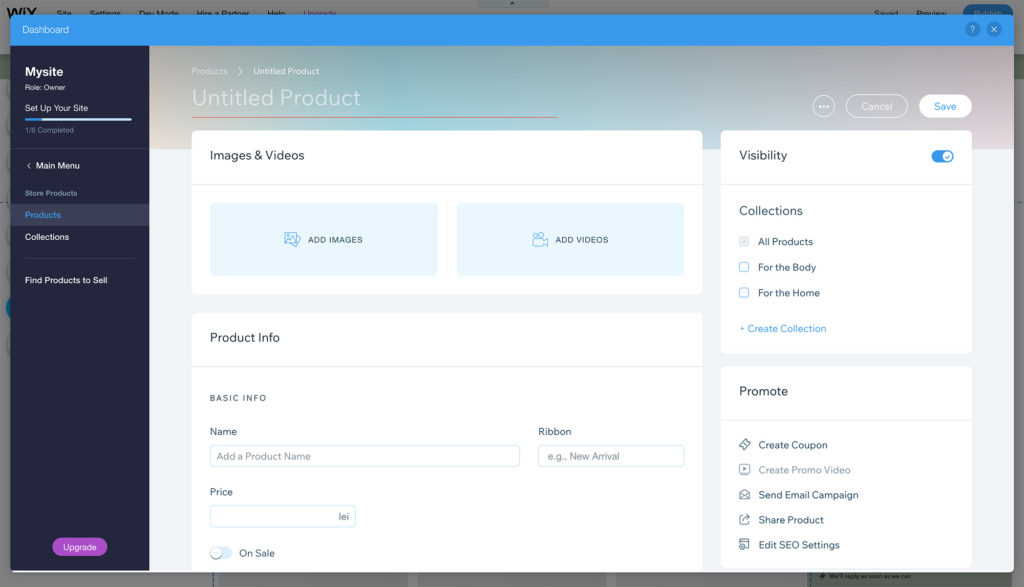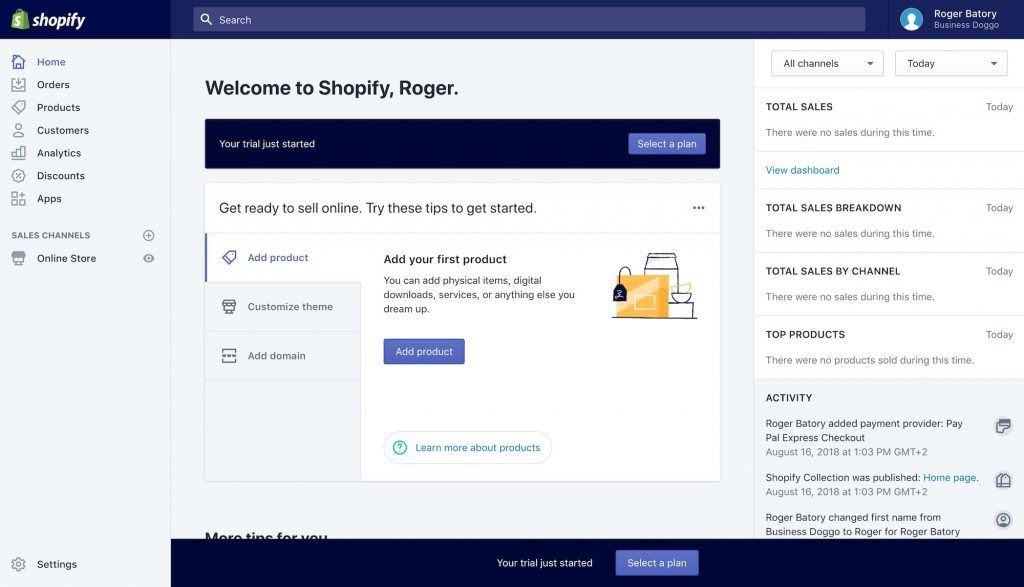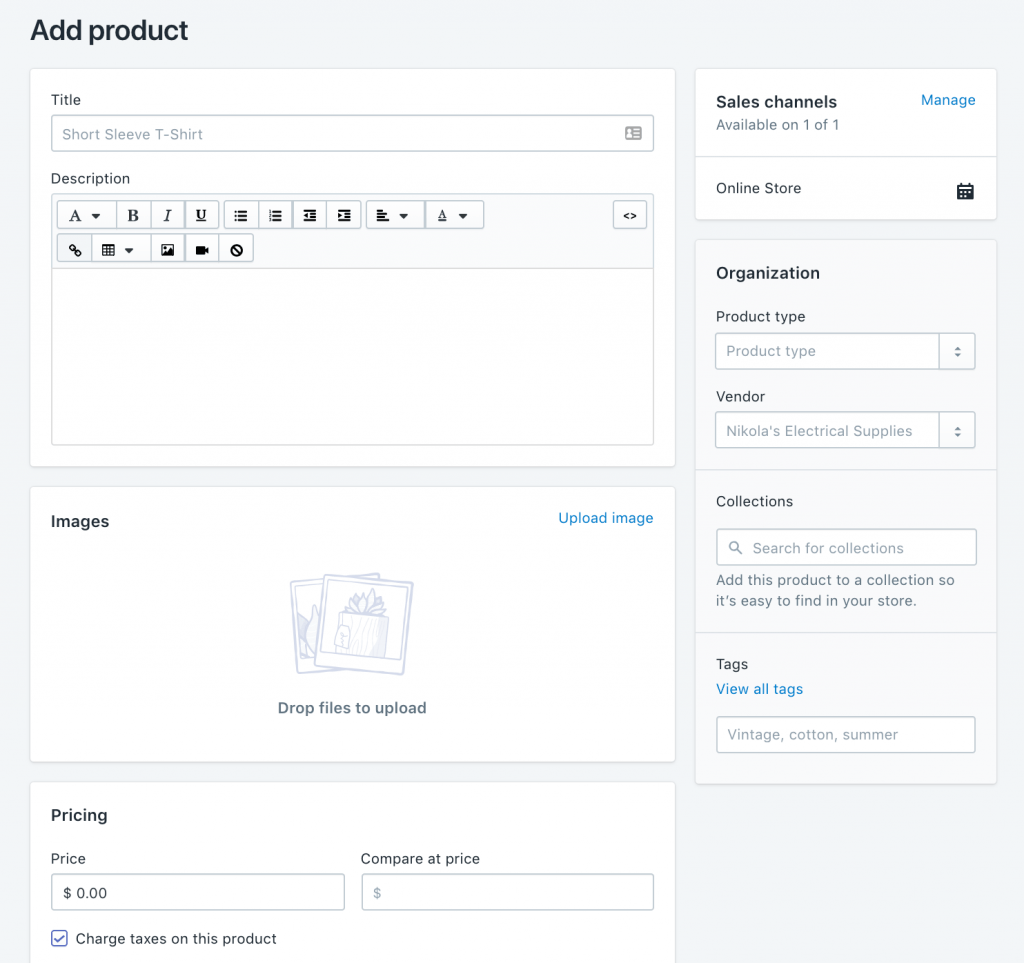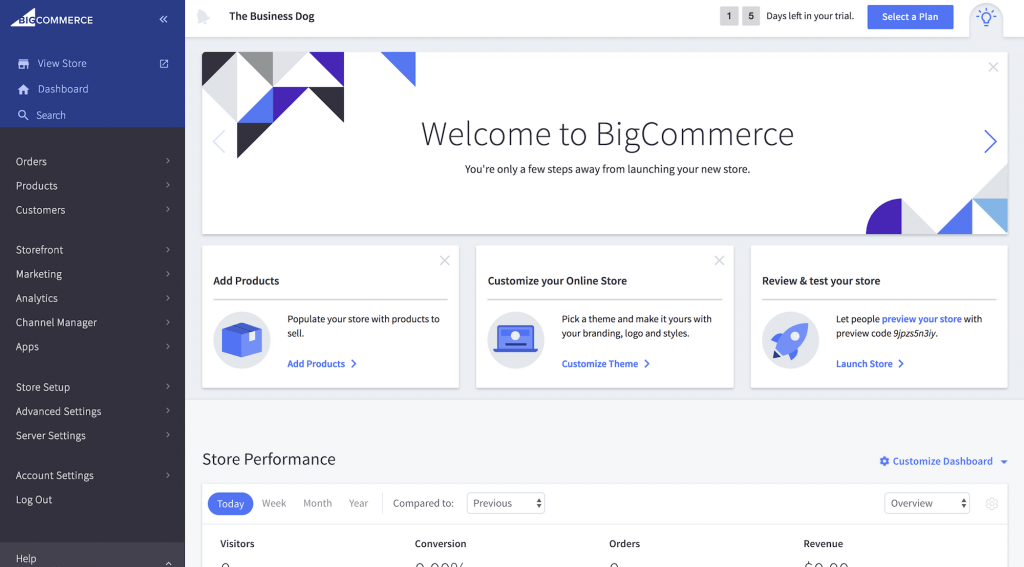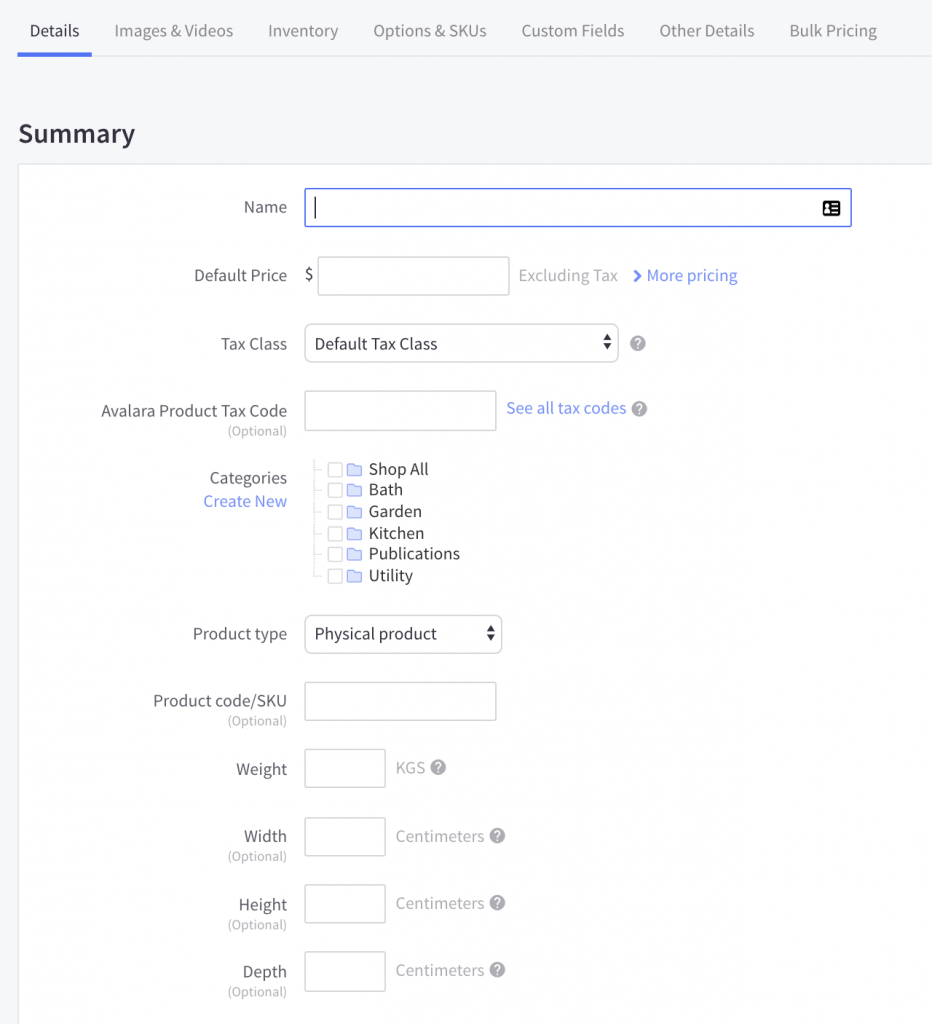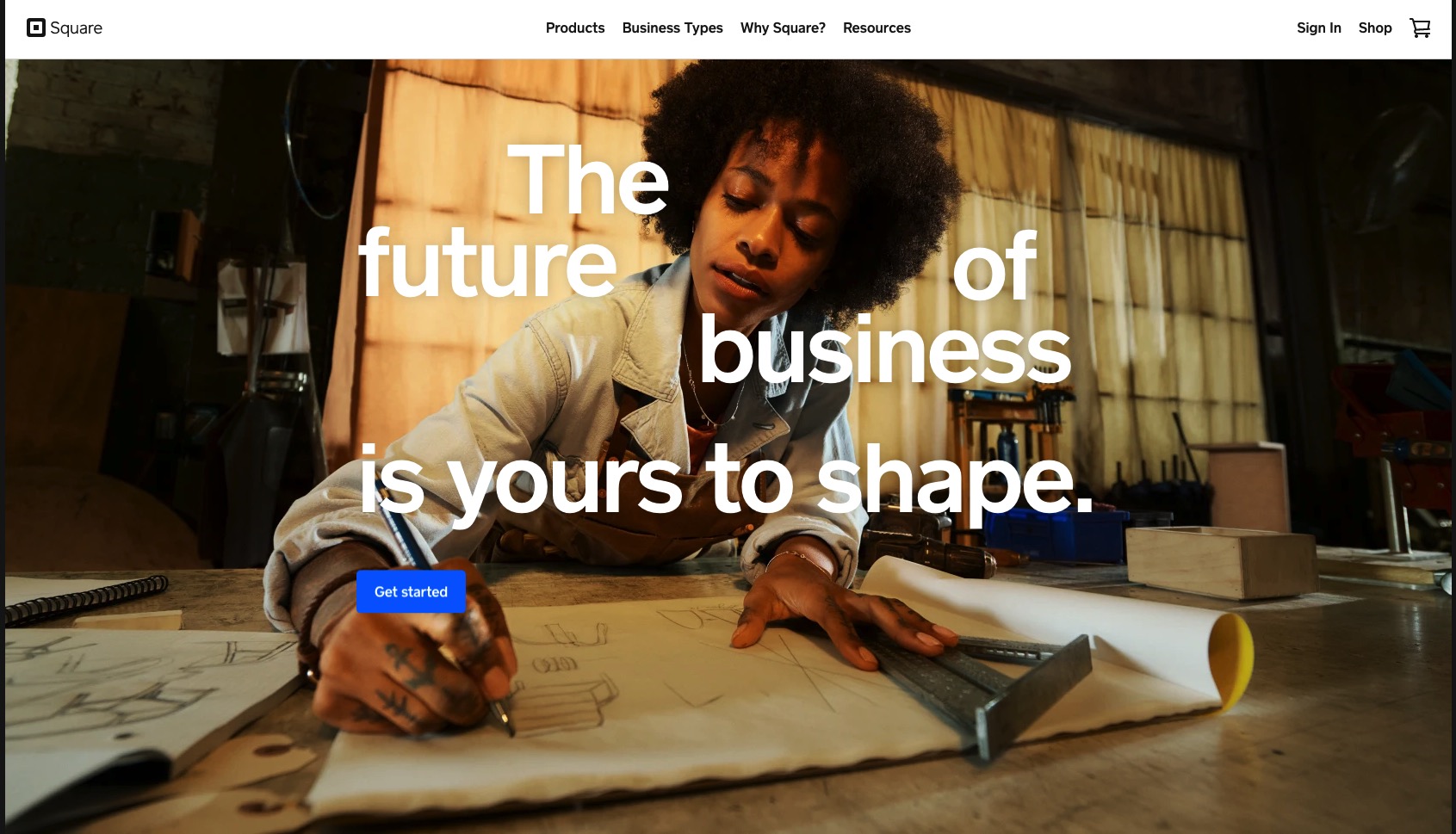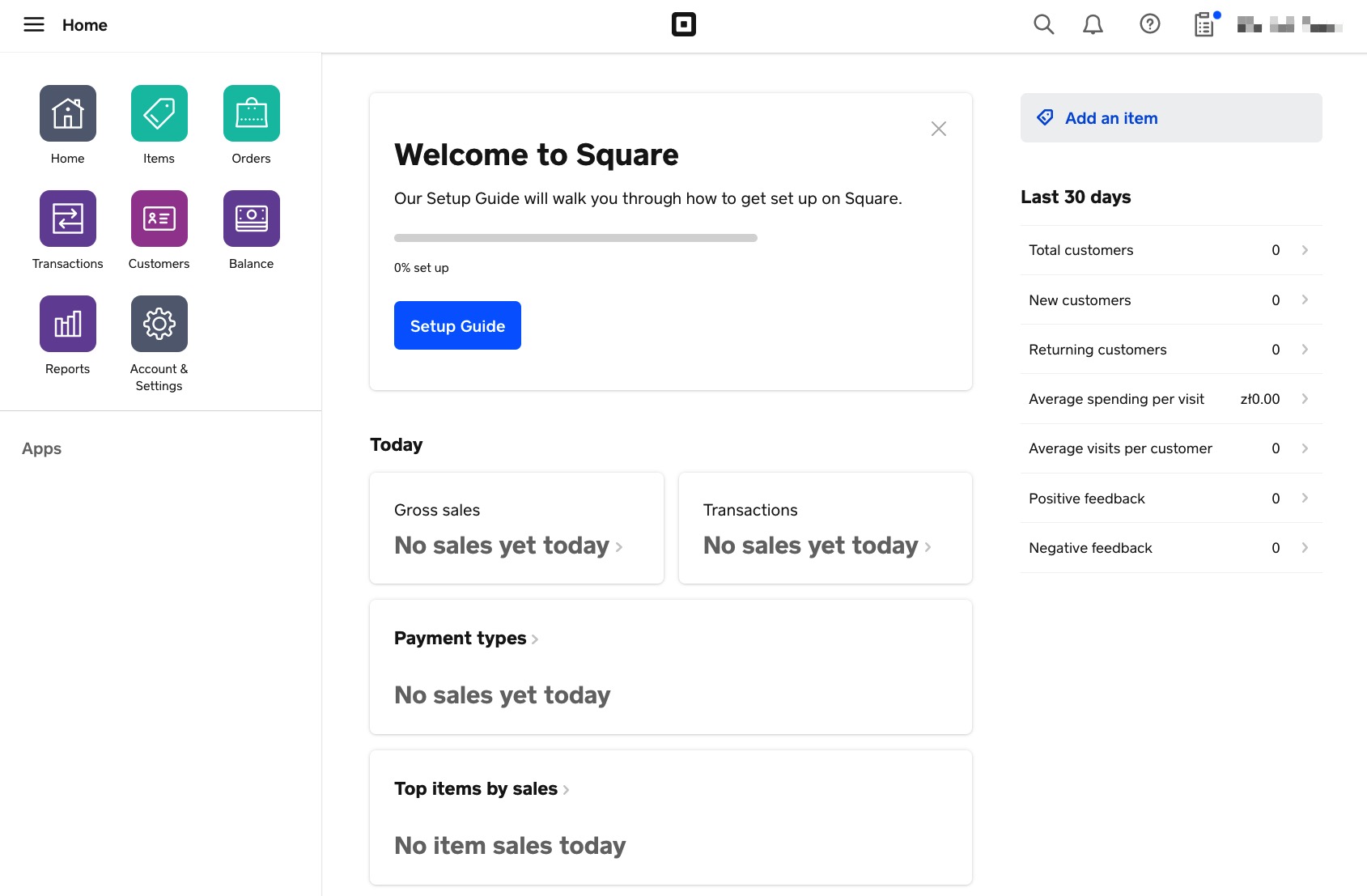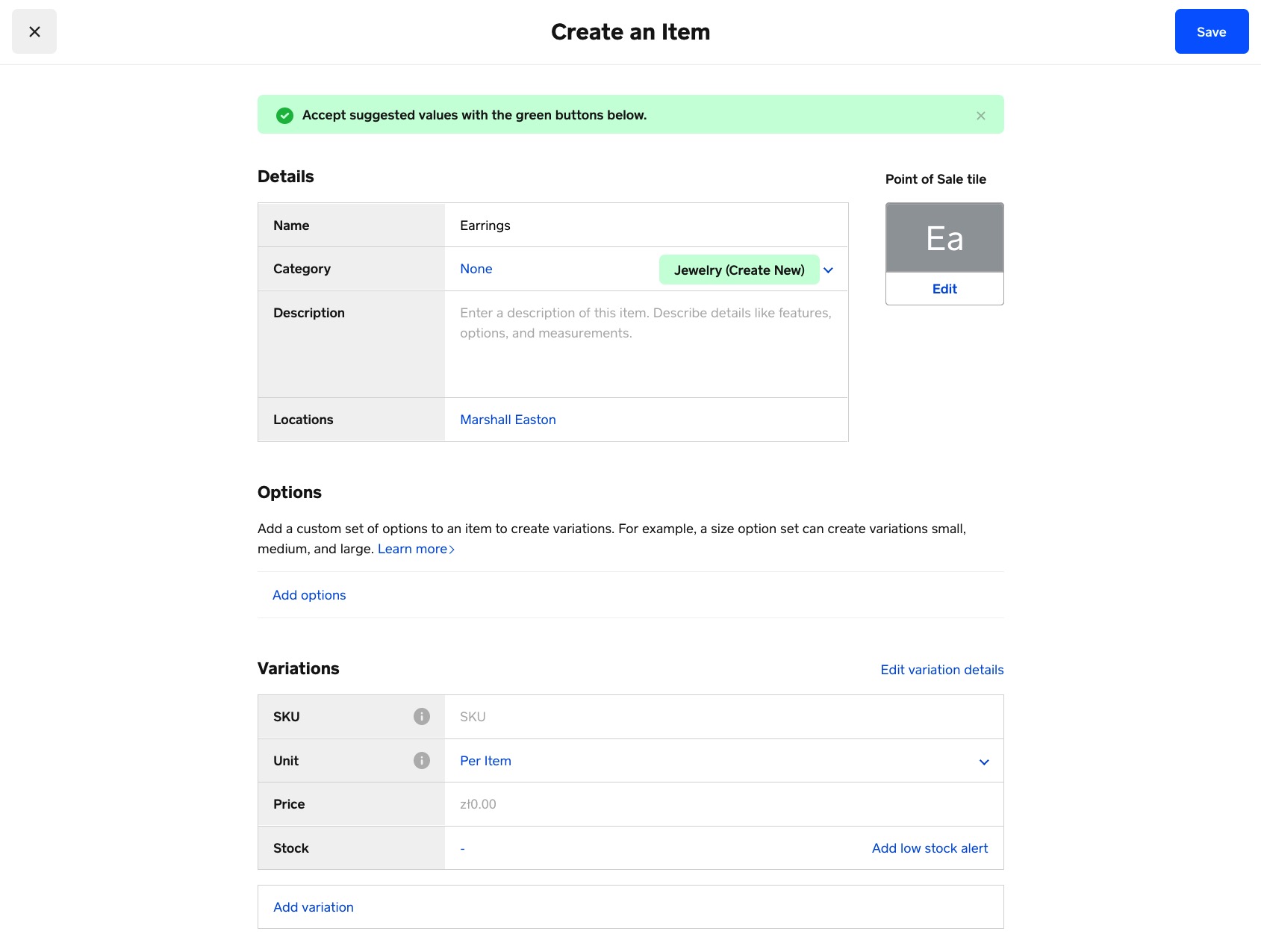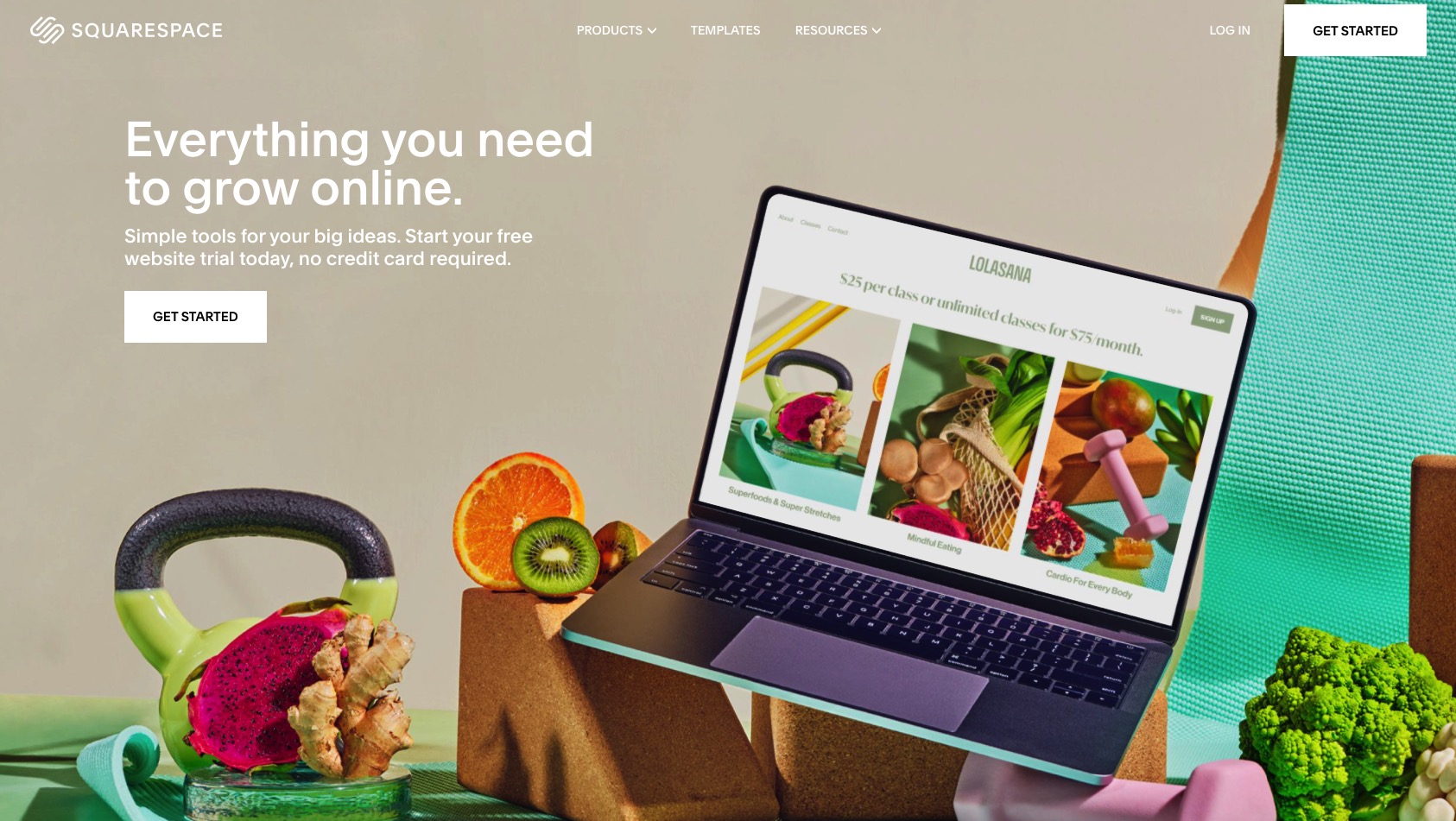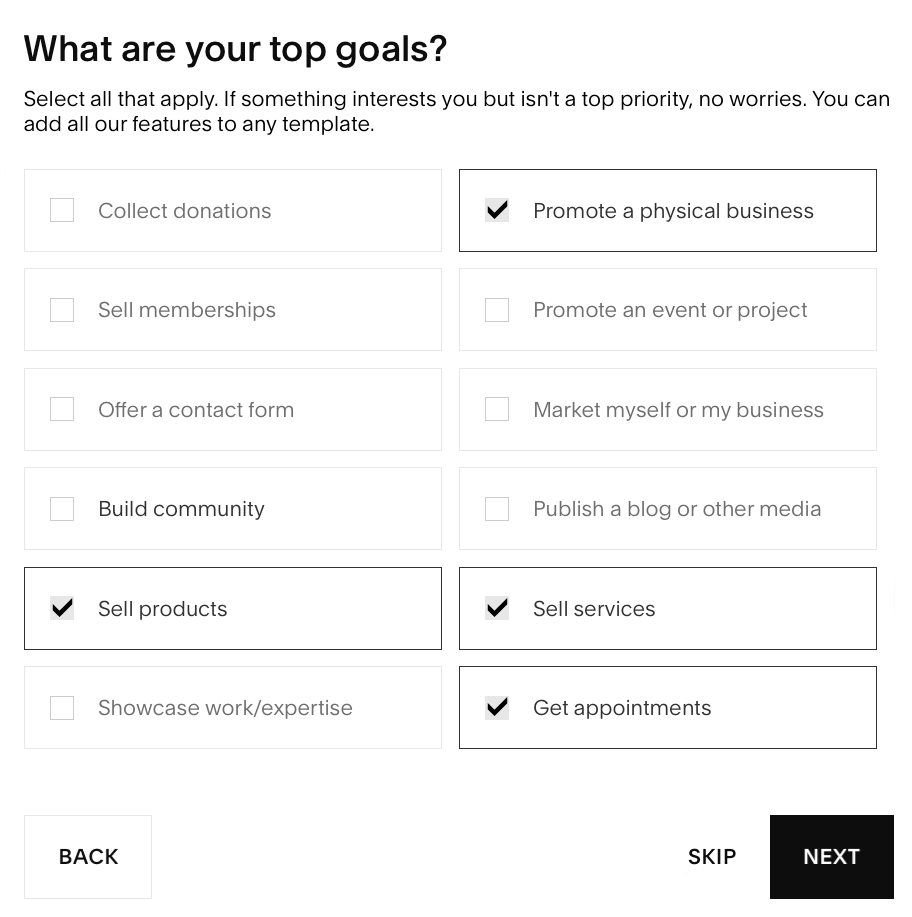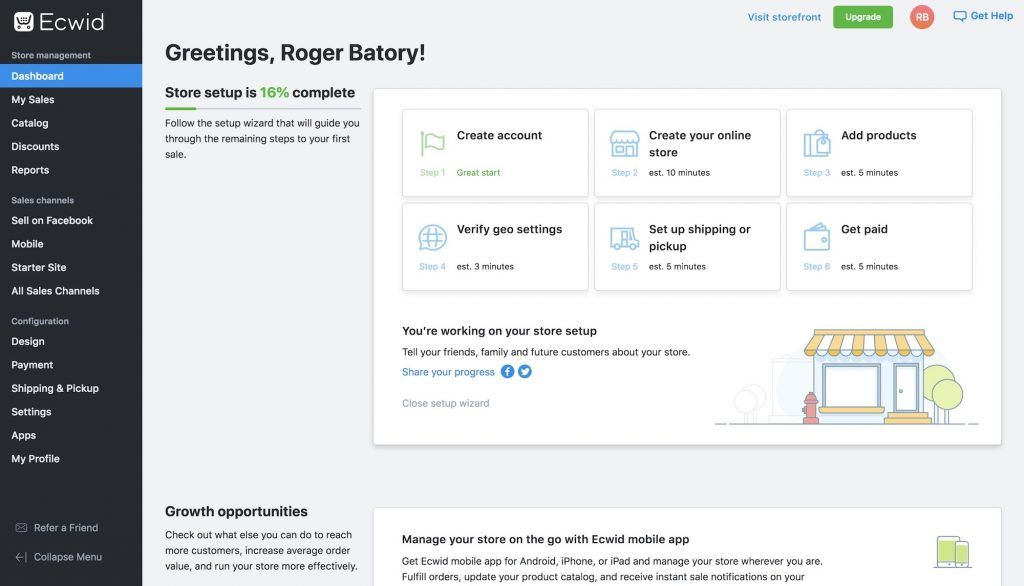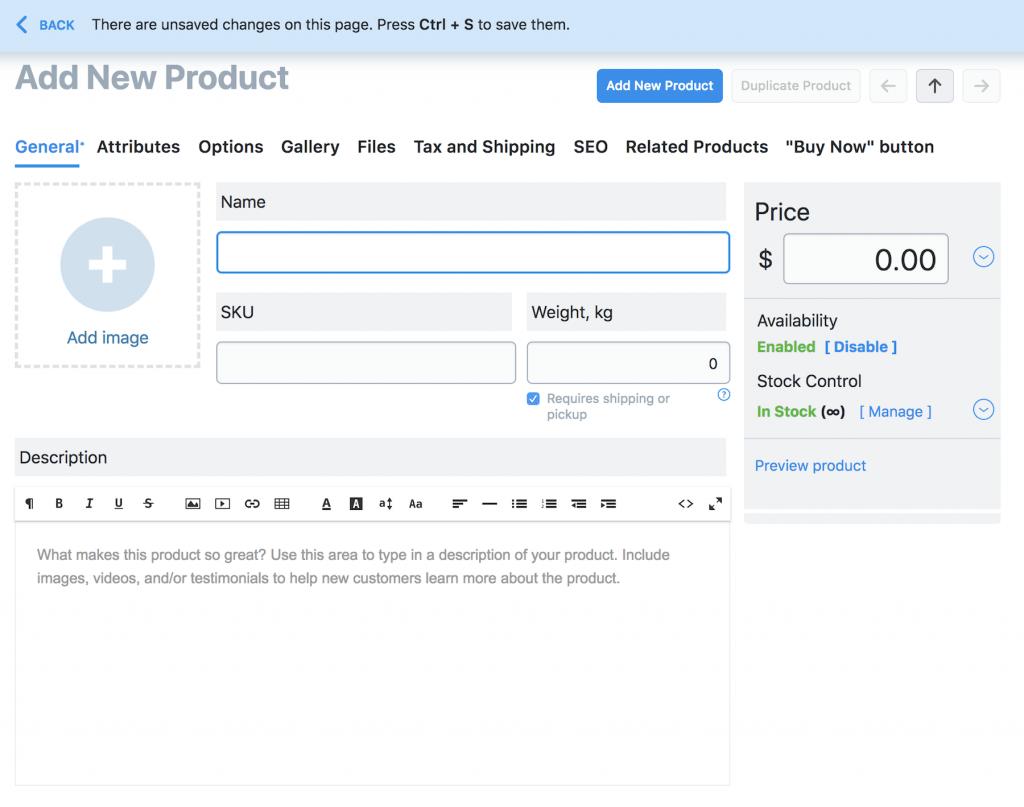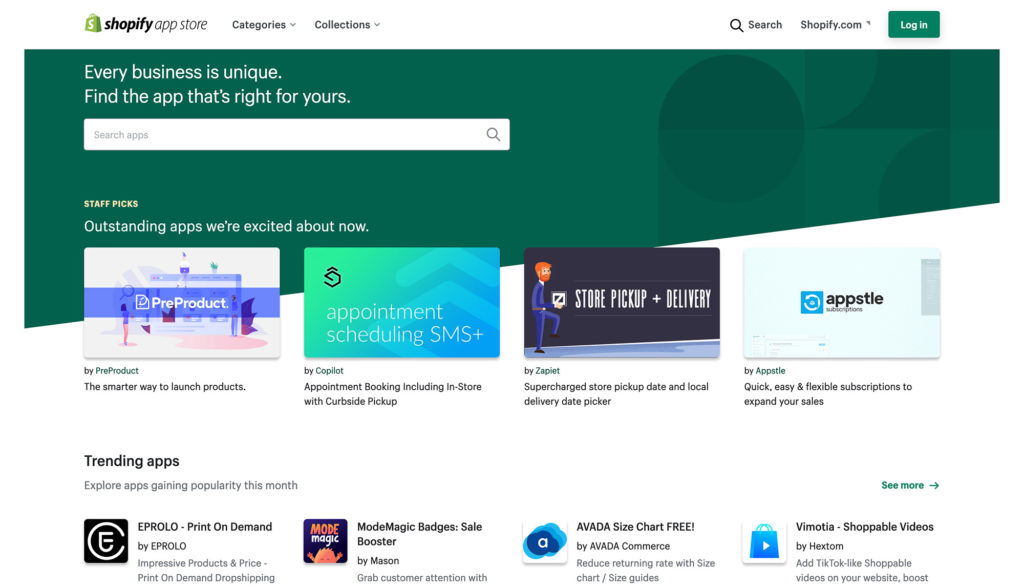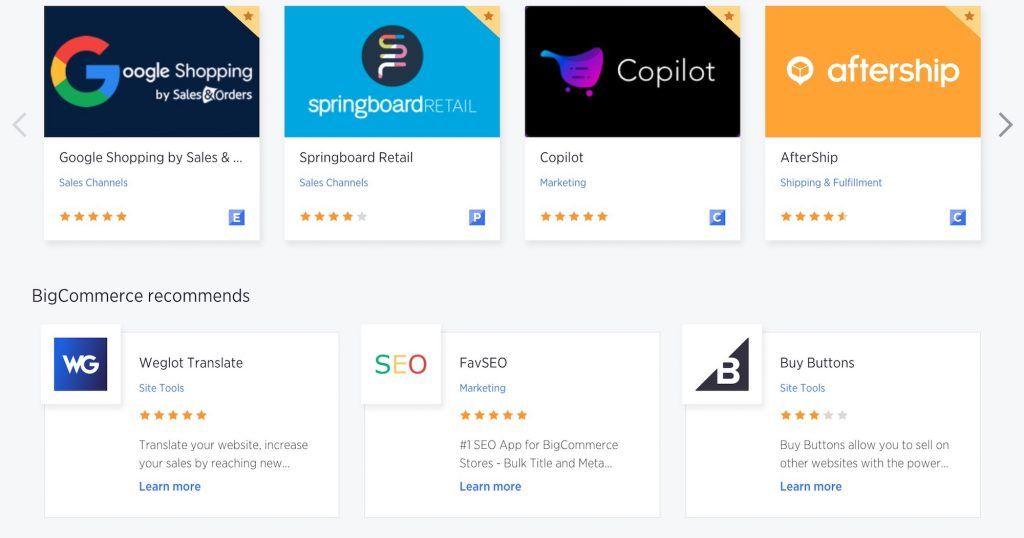The quest to discover the best ecommerce platform out there has been our ongoing goal here at ecommerce-platforms.com ever since the site was established. We invest real hours each week to test and examine each platform, all in an effort to find out how viable they are among the top ecommerce platforms in the market.
We're doing all this testing so that you don't have to.
The resource you're reading right now is a summary of our findings, plus advice on how to pick the best ecommerce platform for your individual needs!
No time to read? Here's our no.1 pick when it comes to the absolute best ecommerce platform in the market:
Wix is one of the most popular premium website builder on the market today. It's not only easy to use, but incredibly versatile too. Business leaders can run multi-channel advertising campaigns with Wix, improve their sales outcomes, and publish content easily too.
Packed with features, including dedicated ecommerce plan options for companies that want to sell online, Wix is an obvious choice for many companies. Yet, despite a wide selection of features, Wix is surprisingly affordable, with a range of packages to choose from that suit any business.
If you're looking for an all-in-one website building tool that can enhance any ecommerce business or online brand, then Wix has everything you need. With a robust app market, you can even customize and upgrade your site however you choose.
Shopify is the most flexible, feature-rich and the most complete ecommerce platform of the bunch. Out the box, it already offers everything you might need to run an effective store, and also lets you customize your design and add various feature extensions.
You can also sell pretty much whatever you wish, including physical products, digital products and downloads, services, and even do drop-shipping.
All of that starting at the price of $29 / month, or as low as $9 / month if you're okay with not having an online storefront but instead selling via social media and other channels. I wouldn't have a problem recommending this platform to anyone looking to get started in the ecommerce industry.
As hard as it might be to believe, there are over 120 different shopping cart software solutions out there, and they would all like to compete for the title of the best ecommerce platform in the market. We should know, after all, our work is to test them all out. And we've been doing that…a lot. So far, we've covered each of the top platforms in individual reviews plus created a comprehensive comparison chart looking through the most crucial traits of each platform. We've also ranked all platforms based on their SEO effectiveness.
What you're reading here is an all-in-one summary of which is the best ecommerce platform, plus what makes each of the contenders great. After reading this guide, you will know exactly how to pick the right ecommerce solution for your store.
Here are the best ecommerce platforms that we're going to be testing:
Picking the best ecommerce platform: table of contents
Here's what this comparison covers:
- Pricing 💰
- Features, flexibility, and ease of use ✨
- Templates and designs 🎨
- Apps and add-ons 🔌
- Customer support 🚑
- Popularity 🍾
- Final verdict: here's which platform is best 🥇
- Frequently asked questions 🤔
Without further ado, here's everything we found in our quest to name the best ecommerce platform out there.
Pricing 💰
For many people, pricing is the most important factor, not only when deciding which of the best ecommerce platforms to use, but in general, as they go through life. Personally, I feel that if you are going to be investing a lot of your time and energy into creating your own online retail space, then there should be more important factors than saving $1 on the price of the platform. With that said, though, we also want to aim at getting the most bang for our buck. Here's how things play out.
This is a summary of each platform's pricing, broken down in tiers based on what sort of budget you have set aside:
| Shopify Lite | Big Cartel Free | Big Cartel Platinum | Ecwid Free | Square Online Free | |
|---|---|---|---|---|---|
| $ / mo | $9.00 | $0.00 | $9.99 | $0.00 | $0.00 |
| credit card rates | 2.9% + 30c | 2.9% + 30c | 2.9% + 30c | 2.9% + 30c | 2.9% + 30c |
| staff accounts | unspecified | unspecified | unspecified | 1 | unlimited |
| products | unlimited | 5 | 25 | 10 | unlimited |
| file storage | unlimited | 1 image per product | 5 images per product | unlimited | unlimited |
| bandwidth | unlimited | unlimited | unlimited | unlimited | unlimited |
| support | 24/7 live chat + phone | email Mon-Fri, 9am-6pm EST | email Mon-Fri, 9am-6pm EST | ❌ | 24/7 live chat + phone |
| online store website | ❌ (you just get a “buy” button that you can place on other sites and social media) | ✔️ | ✔️ | ✔️ | ✔️ |
| blog module | ❌ | ❌ | ❌ | ❌ | ✔️ (via add-on) |
| point of sale | ✔️ | ✔️ | ✔️ | ❌ | ✔️ |
| Big Cartel Diamond | Ecwid Venture | Square Online Professional | Squarespace Business | |
|---|---|---|---|---|
| $ / mo | $19.99 | $15.00 | $12.00 | $18.00 * |
| credit card rates | 2.9% + 30c | 2.85% + 30c | 2.9% + 30c | 3% + credit card processor fees (usually 2.9% + 30c) |
| staff accounts | unspecified | 1 | unlimited | unlimited |
| products | 100 | 100 | unlimited | unlimited |
| file storage | 5 images per product | unlimited | unlimited | unlimited |
| bandwidth | unlimited | unlimited | unlimited | unlimited |
| support | email Mon-Fri, 9am-6pm EST | 24/7 live chat | 24/7 live chat + phone | email, live chat Monday-Friday 4AM-8PM EST |
| online store website | ✔️ | ✔️ | ✔️ | ✔️ |
| blog module | ❌ | ❌ | ✔️ (via add-on) | ✔️ |
| point of sale | ✔️ | ❌ | ✔️ | ❌ |
* When paid annually.
| Wix Business Basic | Shopify Basic | BigCommerce Standard | Big Cartel Titanium | Ecwid Business | Square Online Performance | Squarespace Basic Commerce | |
|---|---|---|---|---|---|---|---|
| $ / mo | $23.00 | $29.00 | $29.95 | $29.99 | $35.00 | $26.00 | $26.00 * |
| credit card rates | 2.9% + 30c | 2.9% + 30c | 2.9% + 30c | 2.9% + 30c | 2.8% + 30c | 2.9% + 30c | credit card processor fees (usually 2.9% + 30c) |
| staff accounts | 2 | 2 | unlimited | unspecified | 2 | unlimited | unlimited |
| products | accept payments only | unlimited | unlimited | 300 | 2500 | unlimited | unlimited |
| file storage | 20GB | unlimited | unlimited | 5 images per product | unlimited | unlimited | unlimited |
| bandwidth | unlimited | unlimited | unlimited | unlimited | unlimited | unlimited | unlimited |
| support | 24/7 live chat + phone | 24/7 live chat + phone | 24/7 live chat + phone | email Mon-Fri, 9am-6pm EST | 24/7 live chat + phone | 24/7 live chat + phone | email, live chat Monday-Friday 4AM-8PM EST |
| online store website | ✔️ | ✔️ | ✔️ | ✔️ | ✔️ | ✔️ | ✔️ |
| blog module | ✔️ | ✔️ | ✔️ | ❌ | ❌ | ✔️ (via add-on) | ✔️ |
| point of sale | ✔️ | ✔️ | ✔️ | ✔️ | ❌ | ✔️ | ✔️ |
* When paid annually.
| Wix Business Unlimited | Shopify | BigCommerce Plus | Square Online Premium | Squarespace Advanced Commerce | |
|---|---|---|---|---|---|
| $ / mo | $27.00 | $79.00 | $79.95 | $72.00 | $40.00 * |
| credit card rates | 2.9% + 30c | 2.6% + 30c | 2.5% + 30c | 2.6% + 30c | credit card processor fees (usually 2.9% + 30c) |
| staff accounts | 5 | 5 | unlimited | unlimited | unlimited |
| products | 250 | unlimited | unlimited | unlimited | unlimited |
| file storage | 35GB | unlimited | unlimited | unlimited | unlimited |
| bandwidth | unlimited | unlimited | unlimited | unlimited | unlimited |
| support | 24/7 live chat + phone | 24/7 live chat + phone | 24/7 live chat + phone | 24/7 live chat + phone | email, live chat Monday-Friday 4AM-8PM EST |
| online store website | ✔️ | ✔️ | ✔️ | ✔️ | ✔️ |
| blog module | ✔️ | ✔️ | ✔️ | ✔️ (via add-on) | ✔️ |
| point of sale | ✔️ | ✔️ | ✔️ | ✔️ | ✔️ |
* When paid annually.
| Wix Business VIP | Shopify Advanced | BigCommerce Pro | Ecwid Unlimited | |
|---|---|---|---|---|
| $ / mo | $49.00 | $299.00 | $299.95 | $99.00 |
| credit card rates | 2.9% + 30c | 2.4% + 30c | 2.2% + 30c | 2.75% + 30c |
| staff accounts | 15 | 15 | unlimited | unlimited |
| products | unlimited | unlimited | unlimited | unlimited |
| file storage | 50GB | unlimited | unlimited | unlimited |
| bandwidth | unlimited | unlimited | unlimited | unlimited |
| support | 24/7 Priority live chat + phone | 24/7 live chat + phone | 24/7 live chat + phone | 24/7 priority support |
| online store website | ✔️ | ✔️ | ✔️ | ✔️ |
| blog module | ✔️ | ✔️ | ✔️ | ❌ |
| point of sale | ✔️ | ✔️ | ✔️ | ✔️ |
As you can see in the tables above, there are three companies here that offer free plans: Big Cartel, Ecwid, and Square Online. They are an okay starting point for a new ecommerce store, with an edge towards Square – since they allow unlimited products.
Shopify Lite also stands out due to their original offering. On that Lite plan, you don't get any online store, per say, but instead can use your Shopify buy button on your already existing website, social media, emails, and so on.
Other than that, each platform has its pros and cons when it comes to pricing, depending on which aspect is the most important for you.
Here are some tips:
- Cheapest plan for unlimited products: Squarespace Business is $18. Though, we cannot ignore Square Online, which does offer unlimited products for free.
- Cheapest plan for 100 products: Ecwid Venture is $15. Plus, again, Square Online.
- Cheapest plan for 10+ staff accounts: Squarespace Business at $18.
- Cheapest plan for unlimited bandwidth and storage: Ecwid Free, Square Online Free, or Squarespace Business ($18).
- Cheapest all around, feature-rich option: Shopify Basic ($29) and Squarespace Basic Commerce ($26).
For me, Shopify stands out here as the best ecommerce platform in the lineup since it offers the most opportunities to grow your store. It provides the functionality to really handle large amounts of traffic and turn your site into something special.
A note on Squarespace pricing. Even though you can get started with Squarespace for less than $18/mo, that one cheaper tier doesn't include the ecommerce functionality. Basically, if you want to sell anything online through your Squarespace website, you'll need to pay at least $18/mo for the privilege.
That said, if you need a simple, small store, the cheaper Shopify solution works just fine. And if you want to go free, Ecwid and Square Online are great choices if you can make do with the limitations.
Features, flexibility, and ease of use ✨
If you are a novice online store owner then there is really nothing as important as having all the features you might need at your disposal, and being actually able to use them with ease.
One thing that all of the platforms have in common is the fact that their dashboards are all very easy to navigate. Furthermore, most of the platforms offer some sort of a setup wizard that will guide you through the creation of your first store. Inventory management, design functionality and the setup process all tie into how the overall ease of use is classified in this comparison.
Wix
Wix has something to offer any company, with any business plan. You don't need to know anything about coding to build a stunning Wix website. The drag-and-drop functionality that the company offers, combined with access to a huge selection of powerful tools means that you'll be on your way to an amazing web presence in no time.
Accessing everything from ecommerce functionality to unique templates is easy with Wix, you can even do unique things to serve your customers, like set up booking widgets or distribute music over the web. Wix even has dedicated tools for restaurants.
Some of the features you can expect include:
- Over 500 templates
- Total design freedom with drag-and-drop
- Industry leading integrations
- Mobile friendly designs
- A full app market with hundreds of connectors
- Advanced design options
- Unlimited fonts
- Media galleries
- Scroll effects
- Tailor made content
- Original AI designs
- SEO features
- Unified database management
- Open platform API connections
- Restaurant reservation apps
- Booking
- Event control
- Forums and memberships
- Art stores and music selling
- Analytics
- Contact management
- Free hosting
- A professional mailbox
- Custom domain name
- Social media connections
- SSL certificate
… The features just keep coming.
Shopify
Shopify has it all in terms of an easy setup, with a handy dashboard area for quickly adding products, customizing the look of your site and more. It's cool because Shopify asks you if you plan on moving from another platform during the signup process. The system then provides a link for importing products from your previous store.
Adding a product is clear and easy, with fields for titles, descriptions, price and more. The reason I think this is easier to use than the other options is that it explains what each field is used for, removing all doubt when typing in information.
You can see the same simplicity when managing your customers and their details, orders, and your store stats. Every section of the store is easily accessible from the main menu and no option is hidden.
The goal of Shopify is to really make it possible for everyone to launch their own ecommerce store, even without having any design or development skills.
👉 Read our Shopify review and check out our Shopify pricing guide.
Feature-wise, Shopify has it all:
- Unlimited orders, products, file storage, bandwidth
- 24/7 support
- Mobile commerce ready
- Use your own domain name
- Point of sale
- Free SSL certificate
- You can accept credit cards + 100 payment gateways
- Automatic carrier shipping rates
- Automatic taxes
- Web-based ecommerce website builder with drag-and-drop
- Full blogging platform
- Multiple languages
- Customer profiles
- Dropshipping
- Customer accounts
- Search engine optimized
- Product reviews
- Gift cards
- Social media integration + sell on Facebook
- Inventory management
- Digital products
- Product variations
- Level-1 PCI compliant
- Advanced reporting
- Mobile app
- No transaction fees when using Shopify Payments
All this gives you great flexibility. Basically, no matter what type of store you want to launch, Shopify will be able to handle that. Including:
- Stores selling physical products
- Digital products
- Dropshipping
- Services
BigCommerce
Next to Shopify, BigCommerce has the cleanest dashboard and clearest directions for getting your online store built within a few minutes. In fact, the dashboard looks surprisingly similar to Shopify's, with modules for accepting credit cards, customizing your store and more.
Everything is neatly available via the sidebar menu that's been divided into a couple of sections that are thematically related. You can get to your products, orders, and customer info easily, and then you can take advantage of some of BigCommerce's marketing settings, analytics, and other modules where you can optimize your store's appearance.
👉 Read our BigCommerce review and check out our BigCommerce pricing guide.
Adding your products is also very easy to do with the important product attributes clearly accessible. Instead of putting every little detail about a product on a single screen, BigCommerce uses tabs, with each one getting into a different characteristic of the product.
Here are the other features you can find in BigCommerce that make it a contender for the best ecommerce platform:
- Unlimited products, orders, file storage, and bandwidth
- 24/7 live chat support
- Point of sale
- Visual store builder
- Migrate your store and import products
- Accept payments via PayPal powered by Braintree, Stripe, Apple Pay, Pay with Amazon and dozens more
- Manage orders and inventory
- Sell via Facebook, Pinterest, eBay, Amazon and Square POS
- Multiple marketing features
- API
- Multi-layered hosting security and DDOS protection
- Level 1 PCI-compliant hosting
- HTTPS
- Get found on product comparison sites
- Encourage return visits with email marketing
- SEO features
Overall, BigCommerce is a nice alternative to Shopify if that's what you're looking for. The feature set is just as vast and impressive with roughly the same pricing (that is until your sales grow too much, at which point Shopify is the cheaper option).
Square Online
The first thing that stands out about Square Online is their focus on ease of use while, at the same time, delivering quite powerful features under the hood.
Just to name a handful of highlights:
- Unlimited orders, products, file storage, bandwidth
- Offer appointment booking
- Sell event tickets
- 24/7 support over chat and phone
- Point of sale with automatic order and item sync
- Inventory management
- Accept credit cards
- Accept online donations
- Tax calculations
- Visual ecommerce website builder tool
- PCI compliant
- Mobile apps
- Offer pickup, delivery, or shipping
- Instagram integration
- Facebook ad integration
- Customer reviews
- Abandoned cart emails
- Discounts on shipping rates
- SSL certificate
- Coupons and gift cards
- Order status text alerts
- Customers can customize their orders and pickup hours
- SEO features
👉 Read our Square Online review.
The signup process is straightforward. Square will ask you a couple of questions about your business and the kind of online store you want to build.
At this moment you can also set up your POS module. It works by downloading the official app for either iPhone or Android and following the setup instructions there.
The dashboard is rather interesting looking, especially compared to other competing solutions on the market. For once, you can grab onto any section from the sidebar and drag-and-drop it into where you'd like to have it. This basically means that you can make the dashboard look like you want it rather than having to get used to whatever was there from the get go.
There's also a nice onboarding setup guide which will take you through the key steps of going from nothing to a working ecommerce store. What's particularly good about Square's onboarding compared to the competition is that they chose to focus on key business aspects of launching an online store, rather than just handling the visuals.
For example, Square will take you through the steps of verifying your identity so that you can then link your bank account and start accepting credit cards. This is the first thing that Square wants you to do, actually, and it makes sense – as an online store owner, you want to get off the ground as soon as possible.
Then, Square will show you how to configure your taxes, set up the POS module, and only then get to the other tools that are available in the dashboard.
Adding new products is also well thought through. To make it easier for someone who hasn't had any experience with similar platforms, there are some example products that you can add to your store and get an idea of how everything works.
Overall, Square makes the key steps involved in setting up an online store easy to grasp, and they also don't trouble you with what's not relevant for most store owners. In other words, Square has a “business first” kind of mindset, which most users will appreciate.
Squarespace
Squarespace has been known for how easy it makes the whole process of building a website; and not only for ecommerce stores, but any other type of website as well.
Squarespace is your “do it all” kind of a platform that really can handle anything you throw at it. There's an excellent visual drag-and-drop editor that you can use to put together your website, and you can enable the features you need as you go.
Your whole experience will start by selecting your site's niche/topic and then answering a couple of questions to narrow down on your final proposed website. At this early stage, Squarespace will also ask if you want to sell anything through your website. Then, it'll let you pick the exact types of things that you want to offer. For instance, Squarespace can handle standard retail, selling services, setting appointments, promoting events, even accepting donations, and a couple of other scenarios.
The overall list of features offered by Squarespace is nothing short of impressive. Here are some highlights from it:
- Free custom domain name included
- Sell anything imaginable (products, services, events, subscriptions, appointments, donations, etc.)
- All websites optimized for mobile
- Gift cards
- Point of sale
- Powerful stats and analytics for your entire site and ecommerce
- Customer accounts
- Unlimited contributor accounts
- One Google Workspace account included free for the first year
- Advanced customizations with CSS and JavaScript
- Instagram integration
- Abandoned cart recovery
- SEO features
- SSL security
👉 Read our Squarespace review and check out our Squarespace pricing guide.
With Squarespace's pricing structure, you're going to get progressively more advanced features with each tier. At the same time, all plans allow you to sell unlimited products to all audiences.
Ecwid
Ecwid has a very clear and easy to grasp dashboard, with the most important options highlighted in the center part of it. What's immediately noticeable is the nice onboarding interface showing you how far ahead you are in completing your store setup.
The side menu gives you access to all the other areas of the admin panel where you can adjust the design of your store, manage products, see your orders, customers, and so on.
Adding new products is also a straightforward process. The interface presents the most important parameters of a product in the center panel and makes everything else available via tabs at the top.
Overall, this interface gives you a lot of possibilities, while still remaining easy to use, which is great.
Here are the other features you can find in Ecwid:
- From 10 to unlimited products
- Unlimited orders, file storage and bandwidth
- 24/7 live chat support + phone + priority support (no support on the free plan)
- Sell on multiple sites, blogs, and social networks
- Sell on any device and on the move
- Customer address book
- Smart shipping calculator
- Integrates with WordPress, Joomla and more
- Track inventory
- Sell digital goods
- Accept payments via 40 different payment options
- Define shipping options
- Level 1 PCI compliant
Overall, Ecwid delivers all the features that most ecommerce store owners might need. Plus, it's very affordable, especially if you're okay with having less than 100 products in your catalog.
👉 Read our Ecwid review.
Last but not least, without a doubt, Ecwid offers the best free plan of the platforms featured in this comparison. The only other tool with a free plan is Big Cartel, but that one is pretty limited compared to Ecwid's.
Big Cartel
The main focus of Big Cartel is undoubtedly minimalism. The main dashboard shows you only the most basic stats regarding your store. However, it's hard to call that a flaw, since it's probably exactly what you want to see when you log into your store on any given day.
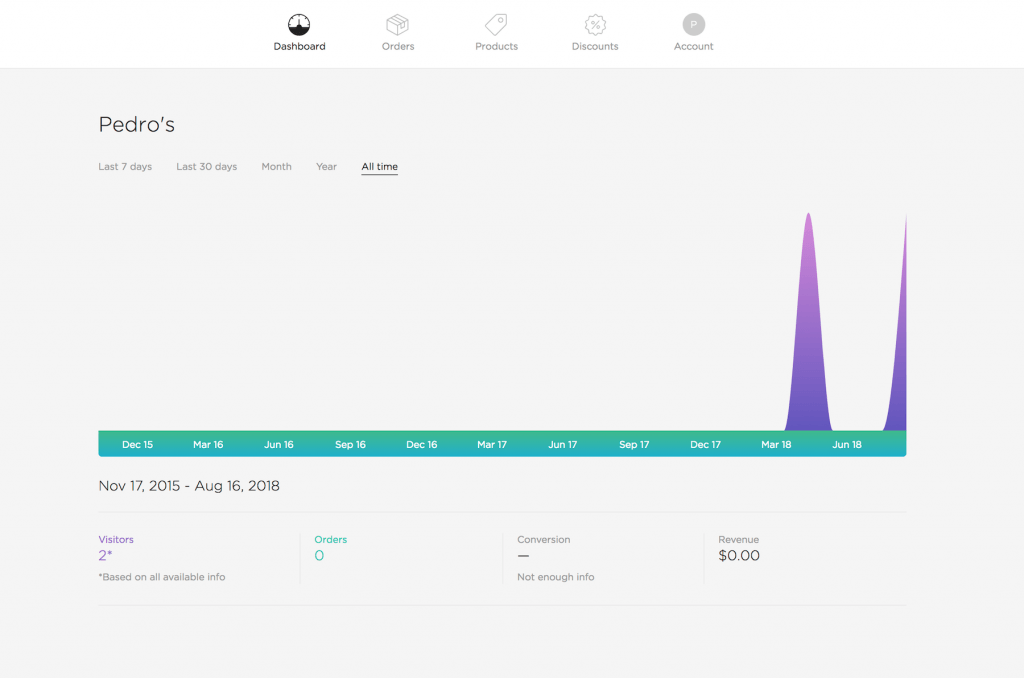
There are just a handful of options in the main menu, highlighting the most common actions that site owners will want to take.
And no surprise, the panel for adding a product is also very clear and rather nice looking.
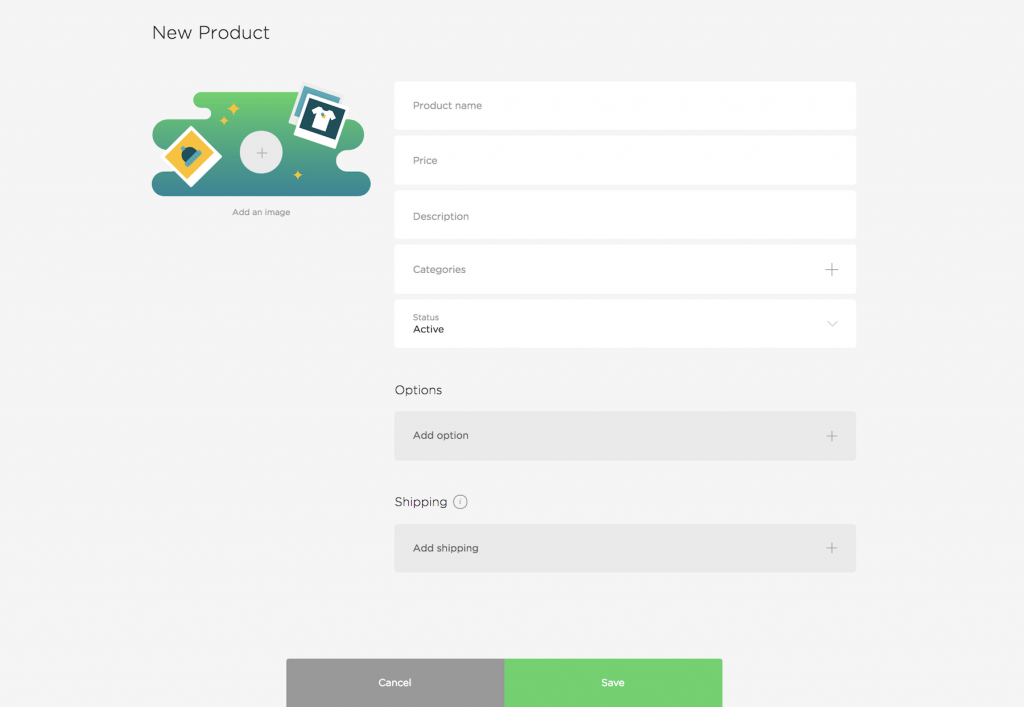
Overall, you get the most basic features that are a must when launching a new ecommerce store, but not much more than that.
Specifically, the features in Big Cartel:
- From 5 to 300 products in your database
- From 1 image to 5 images per product
- Email support Mon-Fri, 9am-6pm EST
- Point of sale
- Unlimited bandwidth and orders
- Responsive and mobile friendly store designs
- Real-time stats
- Search engine optimization
- Promotional tools
At the end of the day, Big Cartel is a very basic player in our journey to find the best ecommerce platform, and – despite it's beautiful design – while it might be okay for you to start with, it can be difficult to grow with it as your sales, products and overall business increase.
👉 Read our Big Cartel review.
One notable thing about Big Cartel is that it's one of the only two solutions on this list that offers a free plan.
Templates and designs 🎨
Let's be honest: design matters, everyone knows that if the design doesn't appeal to the visitor then chances are they will take their shopping elsewhere. At the end of the day, if the layout of your store looks horrible then even if your products are amazing, people won't pay attention to them.
Wix
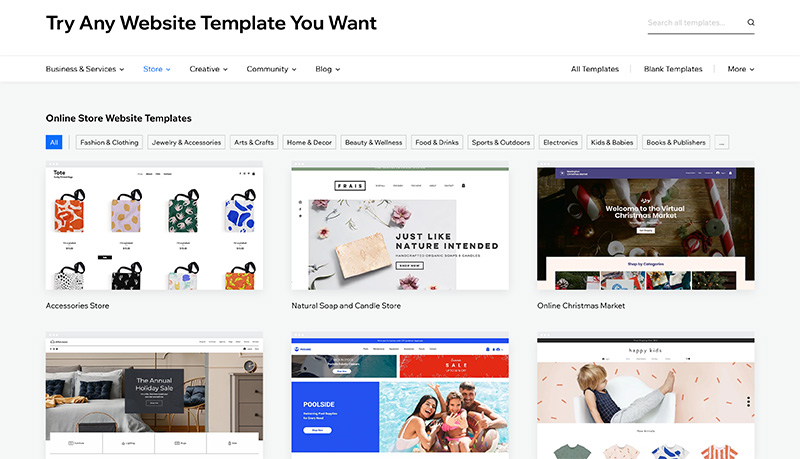
One of the things that makes Wix so appealing is the fact that it comes with so many scalable templates you can use to make your website really stand out. Wix's templates are stunning, and they're modern enough that you don't feel as though you're going to need to change them all the time. You can sell products through a variety of stylish and polished sites and add your own custom changes.
With more than 510 premium templates to choose from, all of the themes available are built to look and feel incredible. You also get the benefit of knowing that you can search for templates according to your industry. Wix categorizes templates into over 70 sub industries, so no matter what you need, you're sure to find it here.
Shopify
If you are looking for a platform that offers some of the most professional looking themes, then you should really be looking into Shopify, the truth is there is no platform that offers better themes than Shopify.
There are more than 100 themes available (both free and paid), all of them quite modern-looking. Plus, you can customize and fine-tune the theme you've chosen until it looks just like you want it.
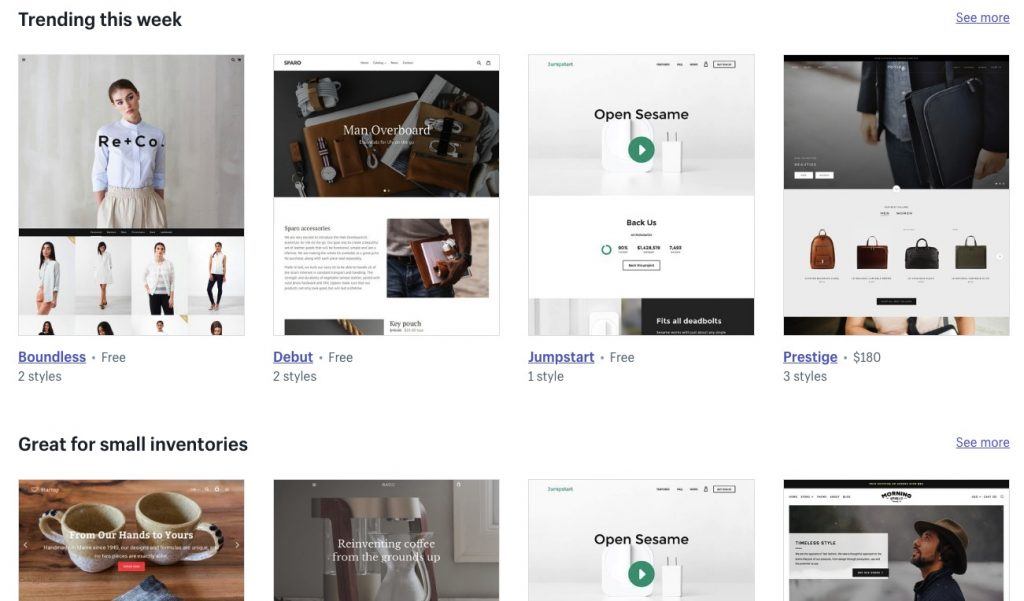
Shopify themes also proove to be highly usable by store owners in real-world scenarios. Just check out this gallery of existing store designs, all built with Shopify themes:
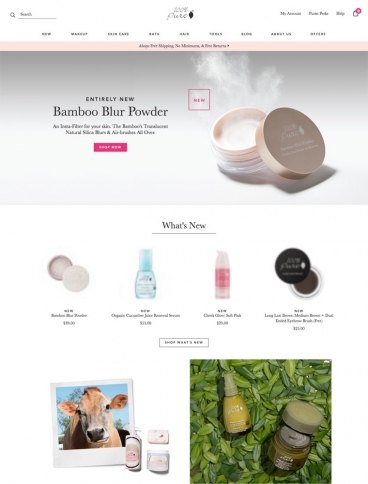

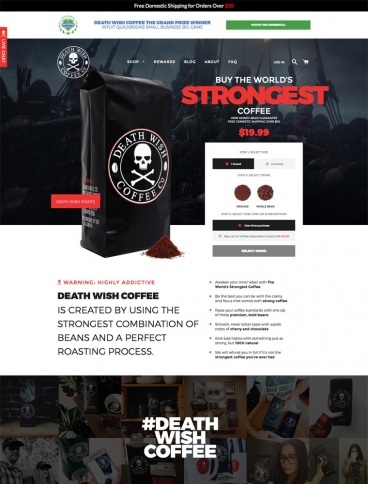
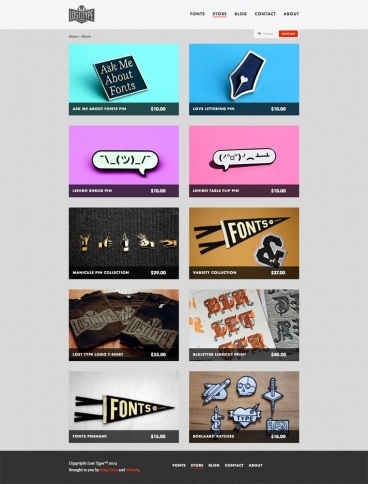
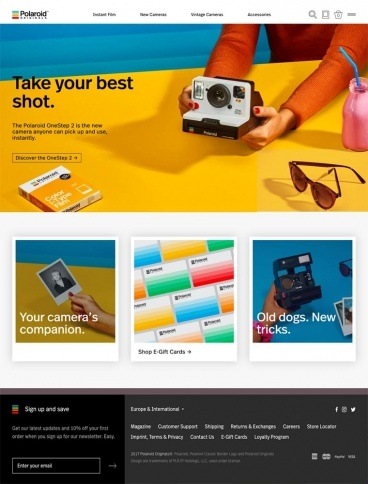

BigCommerce
BigCommerce also has a nice library of themes for you, divided into multiple categories, and all of them responsive and fully customizable. They were developed to establish a more modern, fluid user experience, utilizing cool new merchandising features for categorization and differently sized catalogs. There are both free and paid options available, and I have to say that those free ones really are attractive-looking.
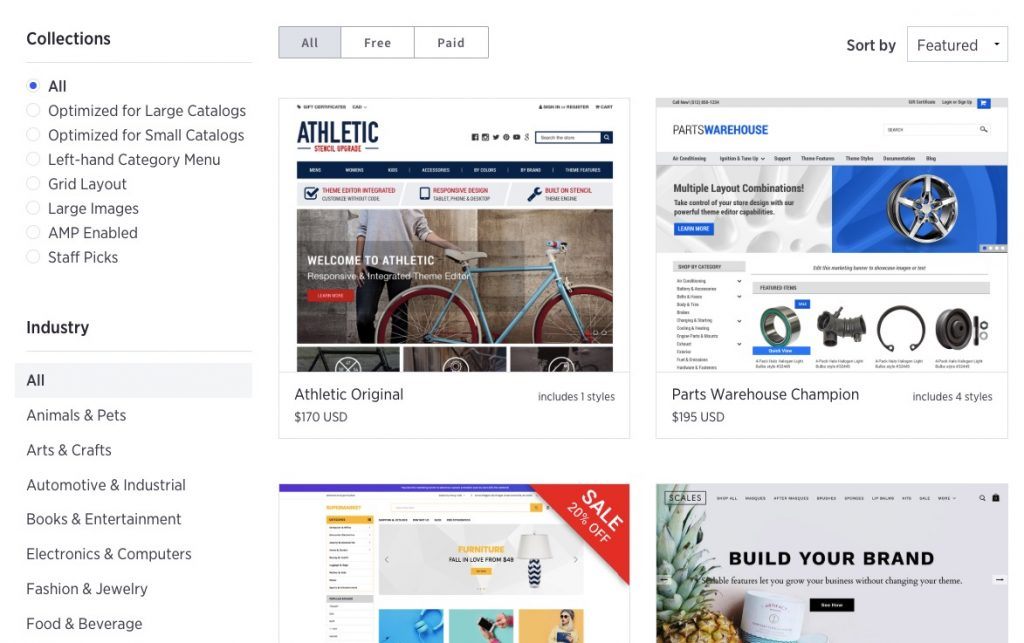
Square Online
Square Online is certainly no slouch when it comes to design options. There are numerous great templates to choose from in their catalog. The templates come optimized for specific niches and types of online stores.
You'll find something for classic retail ecommerce stores, but also restaurants that want to give customers an option to book tables online, service providers, non-profits, and more.
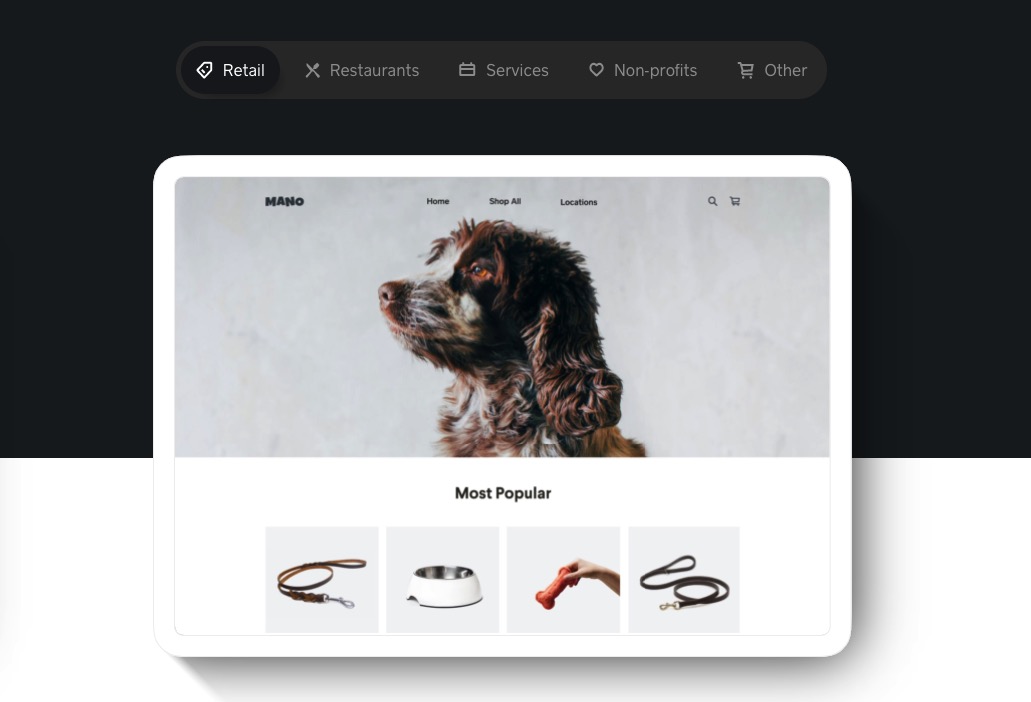
It's also worth highlighting that all Square templates come optimized for mobile viewing (and buying), and give you full customization options via a drag-and-drop visual editor.
Squarespace
The templates is where Squarespace really shines. Ever since the company first launched their tool back in 2003, they've been known for how thought through their designs were and how modern they looked.
Squarespace clearly puts focus on quality over quantity. While 100+ is not a small number of templates by any standard, some of the competition does come with more choice. However, as I said a couple of sentences ago, what sets Squarespace apart is the quality of those templates.
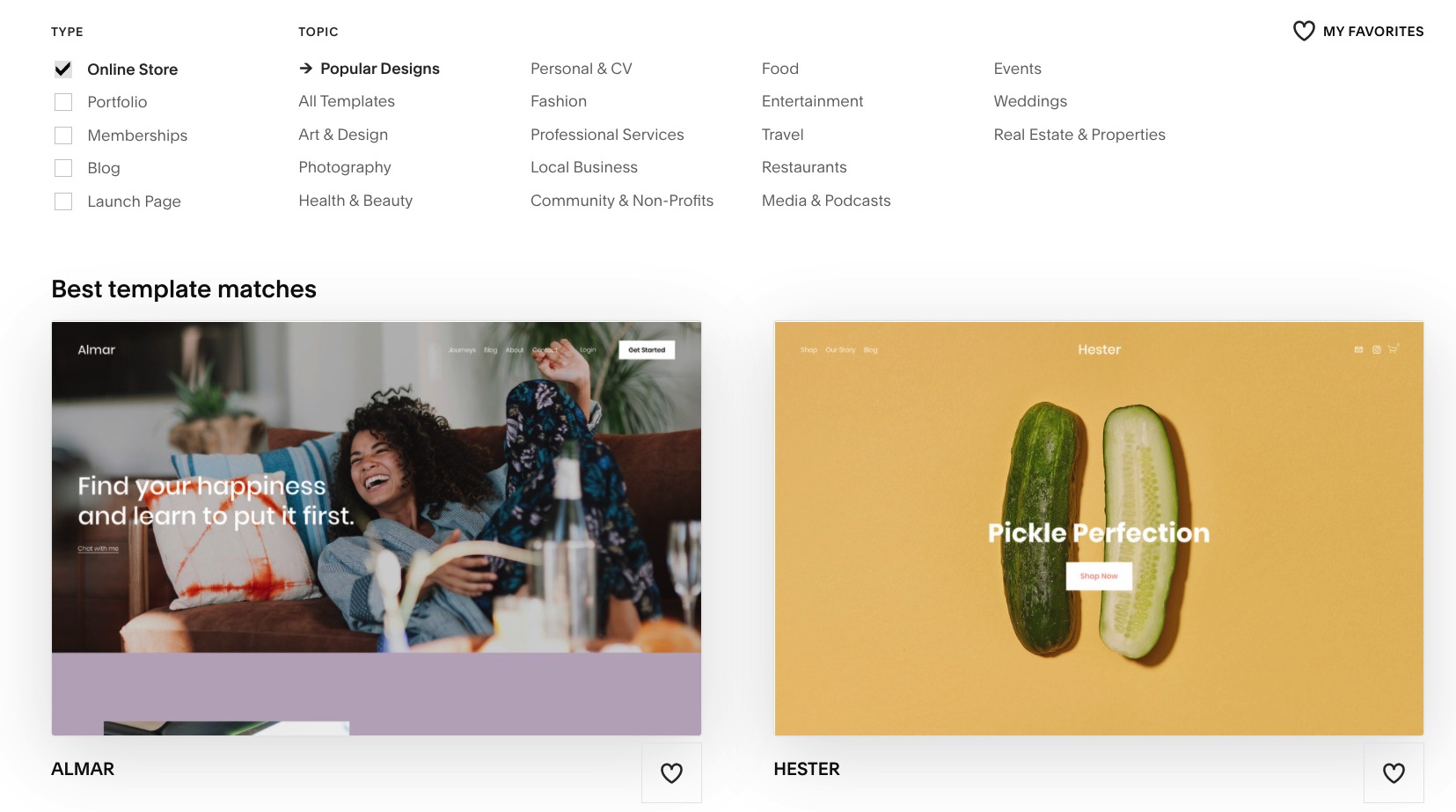
Also, when you're first getting started with Squarespace, the platform will suggest specific templates based on your answers during signup. They all look great and can be customized to match any business or ecommerce store. You can change various visual aspects of your template, replace graphics, and more.
Ecwid
Ecwid has a very surprising approach towards store designs, as in, there are no themes to choose from. At least I couldn't find them in an easy way.
The way it actually works is that you can go into the Ecwid App Market and buy some pre-made themes from third-party sites.
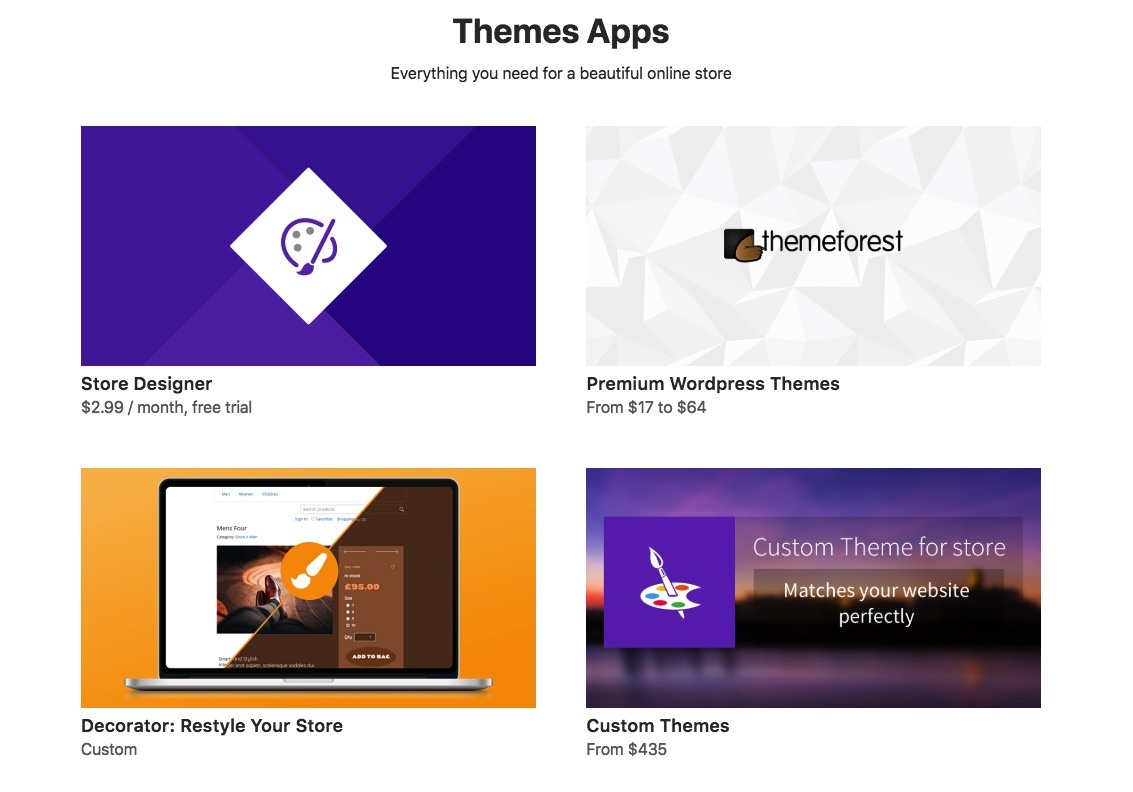
Apart from that, you can customize the basic details about your store's look. Things like image sizes, aspect ratios, product card details, category positions, product page layout, navigation, and a couple more things.
Overall, this might be a good solution for a certain type of user – someone who just wants to get going with a good-enough store and not bother with the design too much – but it doesn't appeal too much to me personally, and it's probably not the best ecommerce platform out there.
While you might think that the number of themes offered by a platform isn't such a big deal. You need to remember that if your store lacks originality, such as having the same theme as 50 other stores, then customers are quick to attribute this to poor quality management from the store owner.
This is much more likely to make them leave your site without even giving you a fair shot.
Big Cartel
Big Cartel only offers a grand total of 15 themes (at the time of writing). This is a major downside since unique branding is a huge part of selling online. However, you can search for Big Cartel themes through Google to find some pretty darn nice solutions from third-party sellers.
It works kind of like WordPress where you buy the themes separate from the platform. It's not the easiest way to go about finding themes, but it gives you more options.

Big Cartel also lacks a drag and drop editor, but the customization isn't the worst thing in the world. All of your design elements are situated to the left, which is fine, but the tools are a little weak, and anything further than that requires coding knowledge.
Apps and add-ons 🔌
Every one of the platforms featured in this comparison offers some apps and add-ons to an extent.
However, the two that stand out the most and offer the biggest selection of apps and add-ons are Shopify and BigCommerce. Both companies offer more than 100 different apps and add-ons that can easily be integrated into your store.
Similar to other market leaders in web design like Weebly and Shopify, Wix comes with a variety of add-ons that you can use to transform your website's performance. The thing that makes Wix so special here is how vast its app marketplace actually is. There are more than 300 apps to choose from right now and the numbers keep growing.
Wix integrations are easy to access and they fit into your website pretty easily. Just remember that if an app gets shut down you can't complain to Wix to get it back. These are third-party tools after all. Integration options include Google Analytics, Facebook Pixel, MailChimp and many others. There are even apps to help you with cart recovery.
Another thing to keep in mind is how easy it is to search for the apps and add-ons, considering you probably have a few items in mind that you want to add to your store. Maybe you need an automated email receipt solution or an app that helps you build a loyalty program.
With Shopify and BigCommerce you can search, filter and browse through categories when in need of a certain app. The other ecommerce solutions either make it super hard to do so, or you don't have the functionality at all.
Square has a huge catalog of add-ons and apps that you can connect with your Square store. These are not only for things that you can install on the store website itself, but also integrations with your other web assets such as social media profiles or other websites entirely.
Of course, all the classic stuff like accounting modules, employee management, email marketing, and so on, are there too.
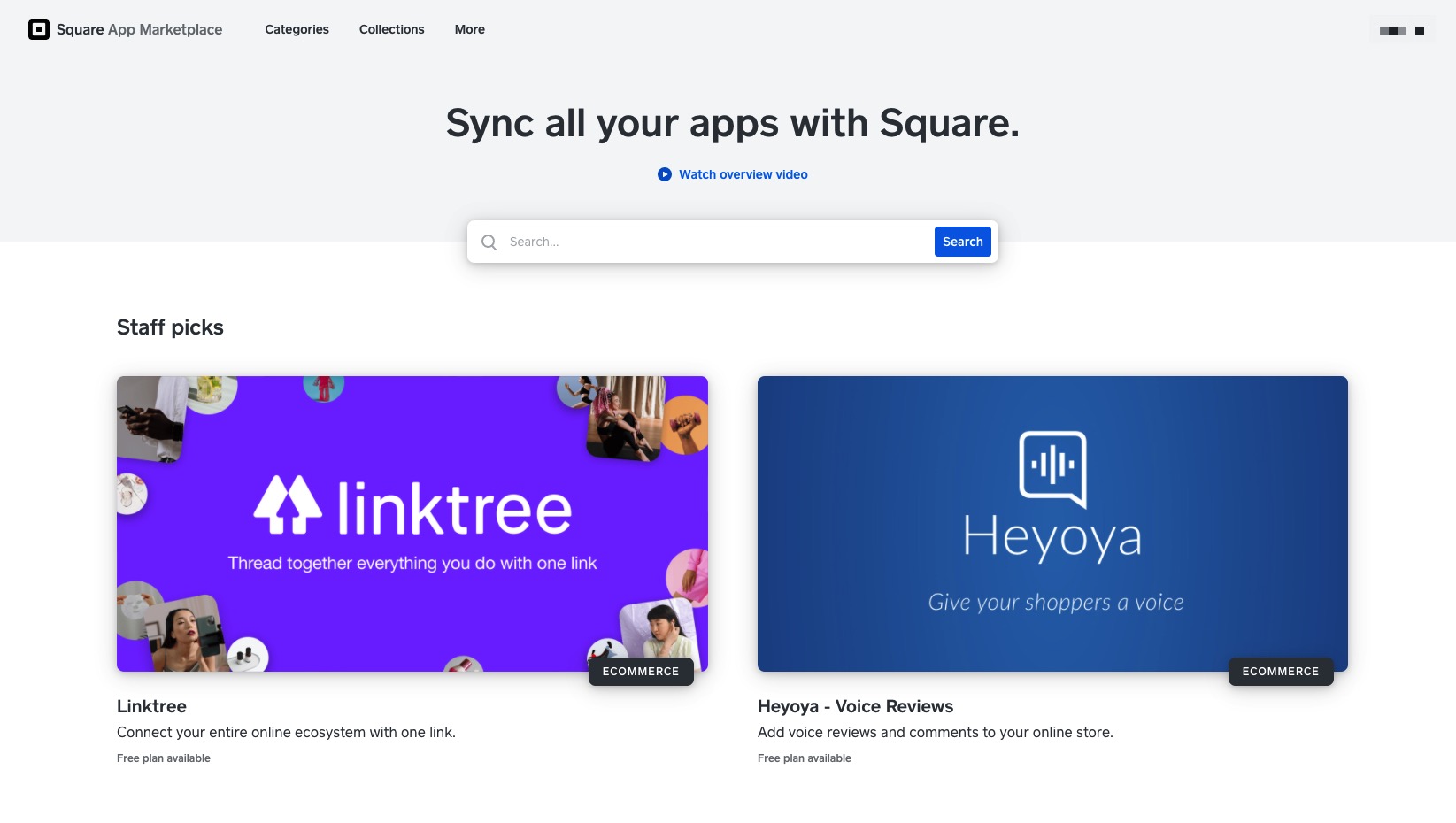
One more interesting aspect of working with Square is that you can also get some useful hardware for your storefront. Square can provide you with anything from their tablet setups for restaurants, registers, terminals, all the way to full kits featuring everything a storefront might need (cash drawers, terminals, etc.).
We're mentioning it here since it has to be considered a kind of an add-on – albeit a more traditional one that you can hold in your hand.
Lastly, Squarespace. They haven't really been known for their extension portfolio. Up until recently, the platform didn't allow any third-party extensions. Instead, they relied on being able to deliver all the features that their users might need right inside the main tool.
They've changed their ways, and now users can integrate their Squarespace sites with roughly 25 extensions. Nothing much at this stage, but the catalog will probably grow in the future.
Customer support 🚑
Chances are you will need support at some point in your ecommerce career, it is, therefore, important to be familiar with the different support offers from the companies.
Here's a quick comparison table of the support options offered vs the price associated with the monthly plan that you must buy:
- Wix: customer support is available via Phone, email, or an online knowledgebase
- Shopify: 24/7 live chat + phone support on all plans ($9 to $299)
- BigCommerce: 24/7 live chat + phone support on all plans ($29.95 to $299.95)
- Big Cartel: email Mon-Fri, 9am-6pm EST on all plans ($0 to $29.99)
- Ecwid: no support on the free plan, 24/7 live chat ($15), 24/7 live chat + phone ($35), 24/7 priority support ($99)
- Square Online – 24/7 support via live chat, phone, email, and social media; there's also a knowledge base that should have answers to the most common questions
- Squarespace – no 24/7 support service; customer support available via email and live chat (only Monday-Friday 4AM-8PM EST); there's a knowledge base available
Most online store building tools come with various variants of customer support.
Shopify, BigCommerce, and Square Online offer 24/7 support through phone as well as chat and email. The other platforms usually offer live chat support, however, their phone support comes with time constraints.
The one company who doesn't seem to offer phone or chat support would be Big Cartel, which only offers email support, and what's more, they only offer it Monday – Friday from 9 AM to 6 PM EST. Also, there's no support if you're on the free plan of Ecwid.
In the end, if you are looking for a company that offers great customer support at any time of the day, then you really should give Shopify or BigCommerce a try.
Additionally, all of the solutions we're talking about have their knowledge bases, which basically let you search a topic and see if someone else has talked about it and addressed it in the past. In my opinion, this is one of the best support areas you can find, since it allows you to resolve a problem while maybe sitting on the phone waiting for a support rep.
Even though they all have these knowledge bases, along with blogs, FAQs and other documentation, Shopify and BigCommerce have the most users, making them far superior regarding knowledge base content. Why is this the case? Simple. Since more people are discussing the systems, by default, more questions have been asked and more answers have been posted.
Popularity 🍾
If you've searched for a platform to run your ecommerce store, you've no doubt stumbled upon at least a few of the names we're comparing today. Although popularity isn't exactly the best motivating factor to make a decision that will affect your future business life, it's certainly worth talking about, considering that when large groups of people lean to a certain solution, we like to hope that it's for a reason.
That said, if you take a look at a comparison on Google Trends, there's only one clear winner in terms of what people are searching and how many of them show interest in the popular consumer ecommerce solutions, but let's hold off on this for a minute. First, have a look at the popularity chart between some of our featured tools: BigCommerce, Big Cartel, Ecwid, across the past 12 months:
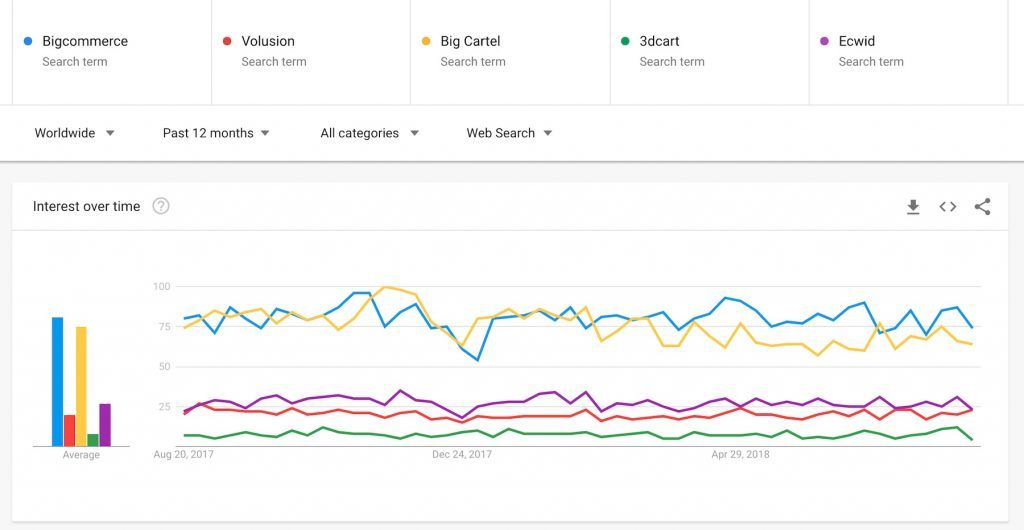
Now take a look what happens when we add Shopify to the mix:
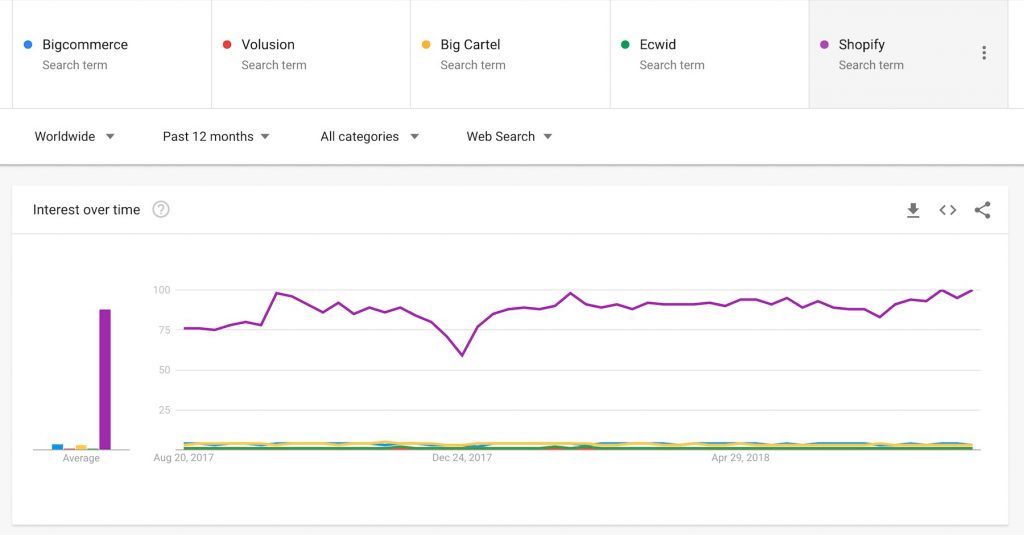
Yes, you're seeing this right, Shopify is roughly 7 times more popular than anything else!
Another way to analyze popularity is to tie it in with where customers are going when they leave a certain ecommerce platform. The reason this is interesting is that it gives you an indicator of which of the companies have kept up with technologies and made improvements to bring in additional customers. A quick market share search on Shopify shows that the Shopify company is gaining most of its customers from BigCommerce, and Big Cartel. BigCommerce is still stealing some customers from Shopify, but it used to be the number one place that people would go after Shopify. We assume it's because of the BigCommerce pricing.
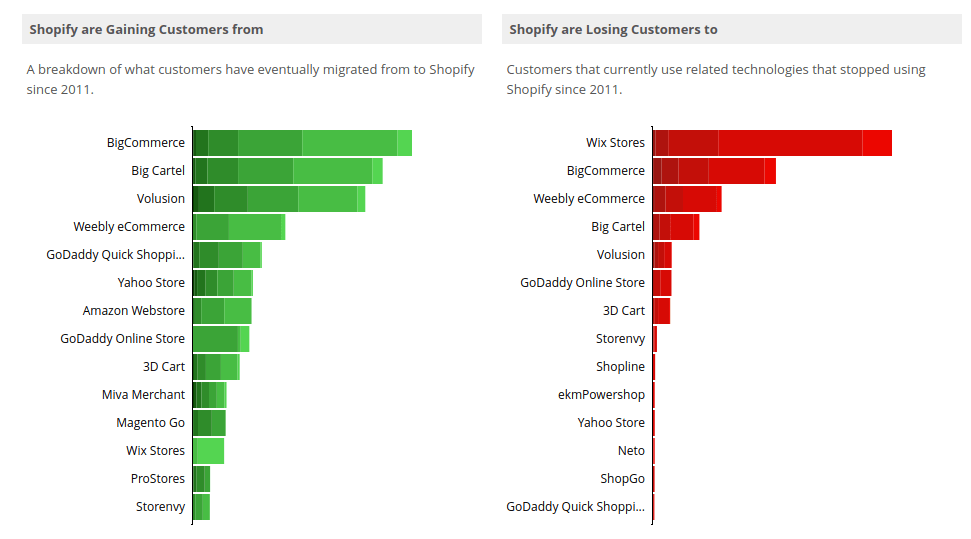
It's worth noting that Wix has earned a boost in popularity recently too. The company's work with high-level celebrities like Jason Statham, Gal Gadot and Heidi Klum makes it difficult to ignore. It's hard to find anyone who hasn't heard of Wix when you're looking for the right ecommerce platform or website builder these days.
Final verdict: here's which ecommerce platform is best 🥇
It really doesn't matter how many comparison articles you read, there is only one person who knows which platform offers exactly what you need, and that person is you. What it all boils down to is which platform will allow you to sell the products you offer in the best manner for both you as a store owner and for your clients.
Based on the recommendations you read above, feel free to click on one, or all of the links below to discover what each platform offers you. I highly recommend starting a free trial with at least two of the solutions so that you can play around with them and see which one feels easiest for you.
That being said, we do have our recommendation when it comes to the best ecommerce platform available. There are two solutions that stand out:
Shopify is the most flexible, feature-rich and the most complete ecommerce platform of the bunch. Out the box, it already offers everything you might need to run an effective store, and also lets you customize your design and add various feature extensions.
You can also sell pretty much whatever you wish, including physical products, digital products and downloads, services, and even do drop-shipping.
All of that starting at the price of $29 / month, or as low as $9 / month if you're okay with not having an online storefront but instead selling via social media and other channels. I wouldn't have a problem recommending this platform to anyone looking to get started in the ecommerce industry.
Overall rating: 10/10
Wix is one of the most popular premium website building tools on the market today. It's not only easy to use, but incredibly versatile too. Business leaders can run multi-channel advertising campaigns with Wix, improve their sales outcomes, and publish content easily too.
Packed with features, including dedicated ecommerce plan options for companies that want to sell online, Wix is an obvious choice for many companies. Yet, despite a wide selection of features, Wix is surprisingly affordable, with a range of packages to choose from that suit any business.
If you're looking for an all-in-one website building tool that can enhance any ecommerce business or online brand, then Wix has everything you need. With a robust app market, you can even customize and upgrade your site however you choose.
Overall rating: 10/10
Can't make up your mind? Check out any of these individual reviews of the best ecommerce platforms featured here:
- Wix Ecommerce Review
- Shopify review
- BigCommerce review
- Big Cartel review
- Ecwid review
- Square Online review
- Squarespace review
Frequently asked questions 🤔
Since there are so many different kinds of ecommerce solutions to choose from, we haven't been able to cover everything in our list. However, we're making sure that all of the software solutions available on the market today get the coverage that they deserve. In the following sections, we're going to look at which tools are best-suited to specific tasks in the digital marketing and selling world.
Let's take a closer look:
What's The Best Ecommerce Platform for SEO?
SEO is a crucial component of a lot of ecommerce software, because it ensures that your products and services are found online. Our top choices for SEO are:
What's The Best Ecommerce Platform for Small Business?
It takes more than just a low price tag to make an ecommerce platform ideal for small business users. You'll also need something that's easy to use. Our top choice is:
What's the best Ecommerce platform for Dropshipping?
Many small business owners consider dropshipping to be the easiest way to get started in the sales landscape. Our top choice for Dropshipping is:
What's the Best Platform for B2B?
Selling to businesses requires a very different strategy to selling direct to customers. If you're looking for a B2B platform, we recommend:
What's the Best Free Ecommerce Platform?
Sometimes, when you're building a new online shop for a small business, your budget will be extremely limited. Our top free eCommerce platform is:
What's the Best Open Source Ecommerce Platform?
An open source eCommerce store is a SaaS offering which allows you to build everything on your backend. You get the tools you need – usually with a free download, and you pay for things like hosting and security yourself. Our top open source choices are:
What are the Best Ecommerce Platforms for Startups
Startups often require a very unique set of features from their ecommerce software. Some will require a variety of tools designed to upgrade their security when they're trading in online services. Others will need to tap into the latest technology for accepting payments in new ways, like through Apple Pay and Google Pay. Our top options for startups are:
Best Ecommerce Platform for Selling Digital Products
Finally, if you're building a website to sell digital products like web hosting services or marketing tools, you need a specific kind of site builder. Our top choice is:
“Can you help me to create a store using Shopify / BigCommerce / etc.?”
Yes, I do work with experts knowledgeable in each of these popular ecommerce platforms. Please fill out this form to make sure I will be able to recommend you the right people to work with.
